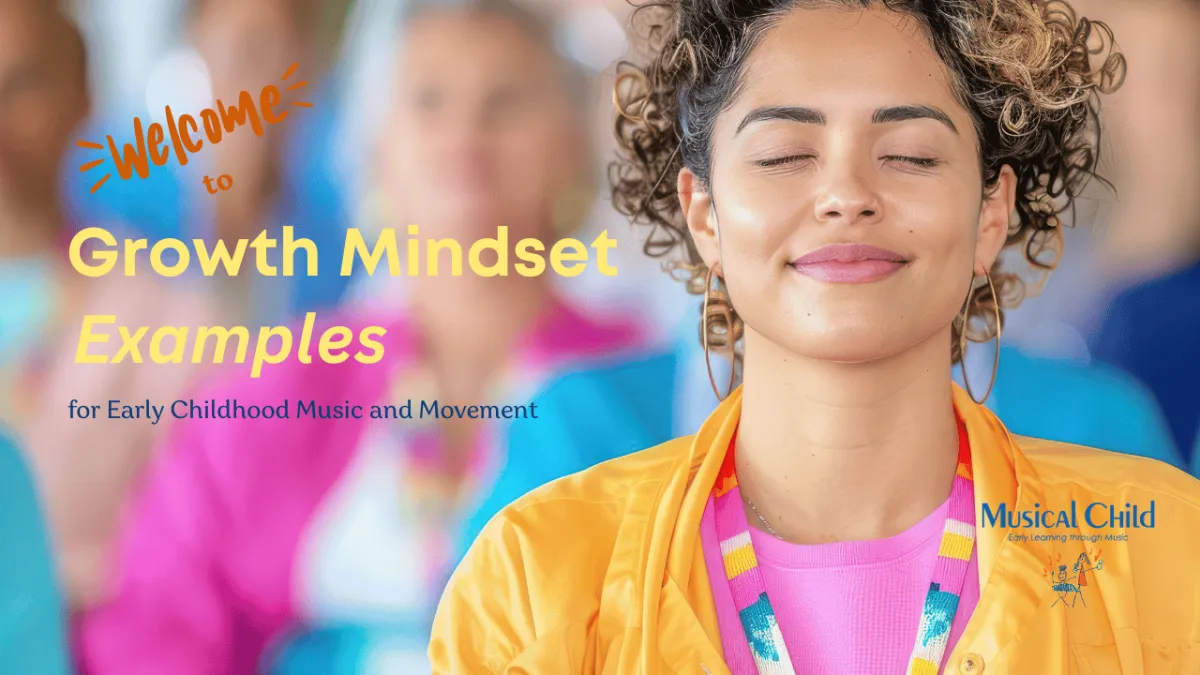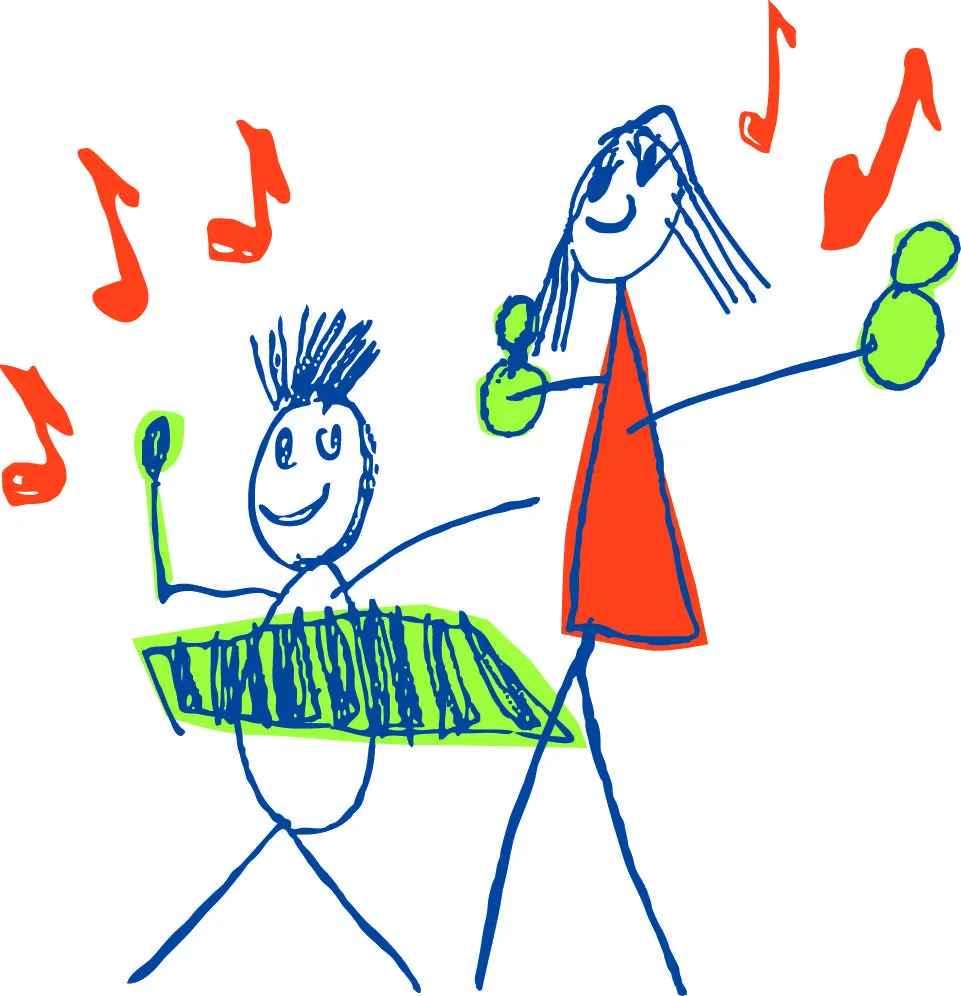
Explain Growth Mindset and Give Examples for Early Childhood Music and Movement
A short video course to explain "growth mindset," the ground-breaking theory about learning first published by Stanford University Professor of Psychology, Dr Carol Dweck in 2006.
To run successful music groups you need the right skills, knowledge and dispositions. In this course we examine dispositions. Find out how having a growth mindset benefits you personally as well as the young children and families you influence.

What Do You Gain?
'Explain growth mindset" deepens your understanding of dispositions oriented towards learning.
Be more aware of your disposition for success and nurture confidence in achieving your goals with the children and families in your practice, as well as your personal aspirations.
Enhance your strategies for holistic development.
Uncover hidden biases in your unconscious, draw inspiration from real stories, with a focus on Deaf artists.
And establish clear goals to make an impact in early childhood music and movement.
Who Is This Course For?
You may be an early childhood educator, a school teacher, a music /dance /drama teacher, a librarian, a singer or other performer, a speech therapist, a parent /carer /grandparent, or an early childhood student.
All you need is an interest in the well-being of young children, curiosity about the power of music, and a love of community-music-making.
You don't need to be able to read music.
Course Contents
Preschool and Junior Music Curriculum is a highly practical, self-directed course where you receive two lesson plans per month to learn and deliver to your own group of children
As you make your way through the down-loadable written and audio resources,
you can immediately apply what you learn in your early learning centre, kindergarten, school classroom, library, performing arts academy, private music studio, therapy rooms, or at home with your own children.
At the end, you will have a collection of 20 lesson plans and massive library of musical recordings that you can use in your music sessions for years. Downloading the music each month automatically licenses you to make use of it in your teaching practice with up to 200 children per enrolment period. If your enrolment is more than that, please reach out for an extended license.
Following written lesson plans is an easy way to start working musically with young children, so applying what you learn in this course will give you great confidence in engaging a child or a group of children.
You will add to your early learning skill-set by following the many practical examples of how to do the ten music activities — and all the monthly variations as different songs are introduced.
When you know how to deliver prepared lesson plans, you will hopefully come to understand how to create your own music program using your favourite songs and the songs of the children and their families.
5 Learning Outcomes for the Children
Your conscious attention to developing their "growth mindset" affects children's:
IDENTITY
strong sense of personal, group, and cultural identity
BELONGING
strong sense of belonging, social connections, and respect for diversity
WELLBEING
strong in social, emotional, and physical wellbeing
LEARNING
strong dispositions and strategies for learning in, through and about sound and music
AND COMMUNI-CATION
effective communication and literacy in musics and other languages
Course Contents
This course to explain growth mindset is packed with examples and strategies.
Growth Mindset Examples for Music and Movement is written and delivered by Carol Biddiss M.Ed.
As you make your way through the video lessons with your down-loadable script, you can immediately follow-up all the links and references as you listen to the talk, by pressing pause, or by taking time afterwards.
At the end of the 6 modules, you will have a collection of examples and a set of references that you can use in your private professional reading. Downloading the notes for each module means that you end up with an extended article of around 8,500 words on the topic of Mindset.
This training is for an individual. If you wish to share the learning with your colleagues, please reach out for an extended license.
Course Structure
MODULE 1: 'The Dweck Growth Mindset'
We begin with a welcome and an outline of the course followed by SECTION 1 'The Dweck Growth Mindset'
This is a brief introduction to the ground-breaking theory of growth mindset, first published in 2006 in the book Mindset and later updated in 2012 and ‘17. A ‘growth mindset’ is the understanding that we can develop our abilities and intelligence.
This section highlights three main ideas—
1) Dr. Carol Dweck led a team of psychologists in research at Stanford University regarding ‘intelligence’.
2) ‘Talents’ and ‘aptitudes’ in music do not guarantee success.
3) We can identify seven key qualities of a person with a growth mindset concerning their own musical skills.
MODULE 2: 'What is a Growth Mindset?'
Now, we explore some ways that all early childhood practitioners can apply the growth mindset approach to their music and movement programs.
What's the best way to foster talent in the arts? According to Dweck, the answer lies not in pressuring young children to perform like prodigies, but in encouraging effort, resilience, and a love of learning through playful, creative experiences and by providing feedback.
This resonates with early learning pedagogy and should appeal to educators working in early learning settings, as well as music teachers and others from diverse backgrounds who run preschool music programs.
MODULE 3: 'Teaching Strategies-Early Childhood Education'
Music in the Childcare and Education Sector
Next, we move to a discussion of confidence, specifically the musical confidence of educators working inside the childcare and education sector.
This will be of direct interest to those of you working in this way, but if you are involved in a different kind of practice, it may be interesting to know the culture in case you decide to offer services in the childcare sector, as performances, workshops, or weekly classes.
MODULE 4: 'Growth Mindset Examples'
Early Childhood Practices for Musicians
This section is designed for music teachers, performers, and others who possess a strong confidence in music but may lack training in early childhood practices.
I hope it interests early childhood educators as well, because you might find these ideas useful as you become an early childhood music [and movement] specialist or hire outside professionals to enrich the music culture of your setting.
MODULE 5: 'Deaf Music- Inspiration'
Uncover Hidden Biases
In this section, we will attempt to uncover hidden biases in our unconscious about abilities and disabilities, get inspired by real stories, and set clear goals to create an impact in early childhood music and movement.
We shine a spotlight on individuals from the Deaf community, past and present and take inspiration from their lives and advocacy.
MODULE 6: 'Fixed Mindset-Challenge'
At the beginning of Carol Dweck’s book, she sets a challenge to grow your mindset. As she suggests, I invite you to take on the challenge, substituting other terms for her original ‘intelligence’ e.g., ‘music and movement talent’ if you’re not musically trained, or ‘skill in understanding children’ if you’re not trained in early childhood theories.
The four questions are given. Decide whether you mostly agree or mostly disagree with them.
Complete your course and gain your certificate.
The Course at a Glance


Duration 1 Hr 15 Min
Viewing / Navigating Time


6 Modules
6 Lessons

2 Audiences
Early Childhood Educators
Musicians and Other Perfromers


6 Script PDFs

112 + Slides
Examples, Links and References


1 Single Payment
12 months access
How Much is This Course?
This course is currently on a special offer.
It's normally $67AUD.
If you enrol in the course now, you will get the special launch price of $47AUD.
We give you 12 month's access to the course to store all your downloads on your computer or hard drive.
This price is for an individual. Registered Training Organisations, Childcare Centres & Music Schools, please contact for licensing or group staff pricing.
Want to try before you buy? View SAMPLE MODULE 2 Describing a Growth Mindset on YouTube.
Creativity in Music: A Growth Mindset Inspires Children
Questions and Support: [email protected]